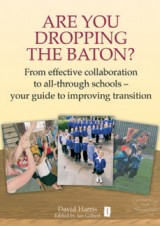As principal of a school with children aged 3-18, Dave Harris knows a thing or two about smooth passage from primary to secondary education.
Q. Do you know of any particularly effective transition projects that have helped primary and secondary schools to work in partnership during y6 pupils’ final term?
A. The key to this answer is in the question – ‘partnership’. I used to think that primary and secondary schools were siblings; the more I have worked in both, the more I think they are 3rd cousins twice removed. Too often the heartbeats are different, the whole drive and ethos completely mismatched. These differences cannot be addressed by simple, tokenistic projects; equally they will not be answered by long sessions of navel gazing focusing on the problems. The best way to develop a deep partnership is to produce enjoyable, engaging projects that have relevance distinct from the act of transition itself. These projects should be delivered on an equal footing, certainly not just planned by the secondary school.
For example, ‘Looking after our neighbourhood’ is a project based around the environment in your school area. This can easily fit into the Y6 and Y7 curriculum in humanities, science, art & English. Pupils plan for a joint fair between primary and secondary pupils. The fair is an interactive, full-day event attended by pupils from other years in the schools. At the end of the day there is a session open to all parents and the wider community. The transition pupils run stalls alongside pupils from the secondary, ranging from some demonstrating how to improve the local environment to others aimed at explaining scientific phenomena.
The message is that a good project doesn’t need to focus on the transition itself!
Q. What can we do to help children form new friendships when they move to secondary school?
A. Most secondary schools will have a few primaries that send the majority of their pupils to them and a number that send just a handful, or even individuals. This results in two very different situations for the new Y7: one where they have many existing friendship groups that can continue unchanged, the other where the pupil has no obvious support structure at all.
One might expect that the former has a higher chance of a happy integration into the secondary school than the latter. In my experience, this is not always the case. I have seen pupils who arrive at secondary in a large friendship group and who, as a result, do not see the need to form new relationships. These pupils can end up being more isolated than pupils who have had to integrate more quickly with ‘strangers’. The first few days are a wonderful time to form new relationships; pupils who are confident enough to throw themselves into this will often be surprised at how easy it is to form new bonds. Everyone feels lost and unsettled at this potentially traumatic time; in these conditions traditional stereotypes and prejudices are put to one side, and some very unlikely but long lasting friendships formed. This, however, is a fairly short term phenomenon, therefore the key to success is to do everything possible to encourage the new pupil to engage in as many opportunities as possible to interact with others in the same position. Summer schools are a wonderful opportunity to meet new people and I know of many long lasting friendships which have started here. After school clubs and evening events are also great introductions. Even if it is out of the youngsters’ comfort zone, encourage them in anything that brings them into contact with new people. A brave smile or two in the first few weeks will produce huge benefits.
 For a detailed guide to transition, see Dave Harris’ book, Are You Dropping the Baton? How schools can work together to get transition right (Crown House Publishing, 2008).
For a detailed guide to transition, see Dave Harris’ book, Are You Dropping the Baton? How schools can work together to get transition right (Crown House Publishing, 2008).
Dave Harris is principal of the Nottingham University Samworth Academy. He regularly speaks at conferences about his experiences of forming and leading an ‘all-though’ school, sharing his views on the benefits of mixed-aged schooling.
If you’re facing a challenge at school, email your questions to .(JavaScript must be enabled to view this email address) and we’ll put them to our expert panel
Teaching five year olds to talk
Ace-Classroom-Support
Reorganise your music room
Ace-Music
Why Boarding School Fiction Feels Comfortably Familiar
Ace-Classroom-Support
